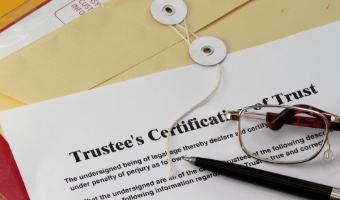Is the trustee or executor not communicating with beneficiaries about the start of administration?
Has the trustee or personal representative failed to properly notify beneficiaries?
Did they neglect to provide beneficiaries with a copy of the decedent’s trust or will?
If you are an interested party, and you answered “yes” to any of these questions, you are right to be concerned. Without receiving timely notice from the trustee or executor, you will not have the information you need to enforce your rights as a beneficiary.
While a trustee or executor’s failure to notify beneficiaries could simply be the result of them not understanding their duties, there are times when it could be a red flag. For example, what if they are intentionally keeping beneficiaries in the dark so they can steal from the trust or estate without anyone noticing?
Suppose a person dies with a trust that names their eldest child as successor trustee and all of their children as beneficiaries, but because the trustee has been estranged from their siblings for years and does not wish to communicate with them, he neglects to notify them or provide them with copies of the trust.
After the siblings file a successful court petition to compel their brother to provide them with beneficiary notices and copies of the trust, they realize that almost the entirety of the trust is going to their brother (the trustee who is also a beneficiary), even though their parent had said on many occasions that every one of their children would inherit equal portions of their trust. This leads the siblings to question whether their brother had manipulated their parent in some way to obtain the outcome he wanted.
The siblings wish to contest the trust on the ground of undue influence, but since they were not timely notified or provided with copies of the trust documents, significant time has passed since their parent died. What recourse, if any, do they have in this scenario?
Fortunately, in situations where a trustee or personal representative’s negligence or deliberate withholding of information resulted in the rights of interested parties being compromised, interested parties generally do have recourse.
In the scenario described above, for example, the beneficiaries would not be subject to the same statutory time limits for contesting a trust as beneficiaries who have been timely notified. In other words, they likely would still have the ability to bring a trust contest.
At the end of the day, personal representatives and trustees are fiduciaries, which means they’re obligated to act in the best interests of the beneficiaries at all times. If they fail to timely notify beneficiaries or provide them with copies of a decedent’s estate planning documents, they are not acting in the beneficiaries’ best interests. This generally is considered executor and trustee misconduct.
Learn more about what trust and probate notices entail, and how to find out if you’re a beneficiary from the following sections.

How Do You Find Out if You Are a Beneficiary?
If you suspect you were named in a will or trust, you may be wondering: How are beneficiaries notified?
Chances are you are asking this question because some time has passed since a loved one died, but you still have not received a trust or probate notice, or a copy of their trust or will.
Some decedents opt to pass down their assets by executing a trust, whereas others opt to pass down their assets by executing a will. If a person does not execute any estate planning documents, their assets will pass to their heirs according to intestate succession laws.
A will generally nominates an executor to manage the estate of a decedent, but it’s the court that ultimately appoints the executor to fill this position at the initial probate hearing. The executor is required to mail notice of hearings in probate court to all interested parties and provide interested parties with a copy of the will.
If an estate beneficiary is not notified about the date and time of the initial probate hearing or provided a copy of the will, they not only may be unable to object to the will’s admission into probate and the court’s choice of executor, but they may not know what they are entitled to under the will.
Trusts also name someone to manage the trust; this person is known as the trustee. Unlike wills, trusts usually are not subject to probate, meaning that whomever had been nominated to serve as successor trustee generally will be the one to serve, unless they predeceased the decedent, refuse to serve, resign from their role, or are suspended or removed. That said, if the nominee for trustee wishes to serve, they should sign a document known as an Acceptance of Trusteeship to confirm they’ve accepted their nomination to act as trustee.
Like executors, trustees are required to notify interested parties and provide them with copies of the trust. If a trust beneficiary is not notified about trust administration or provided with a copy of the trust, they may have no recourse besides turning to the courts to obtain the information and documents they need. This is because trusts are typically not subject to court supervision in the same way wills are under the probate process.
If no will or trust exists, a close relative of the decedent generally can petition the court to become administrator of the estate; however, to be administrator, they must have priority to serve — laws regarding priority to serve as administrator can be found in California Probate Code section 8461.
Administrators in intestate estates also are required to send notices about the opening of probate to interested parties, but they do not have to provide them with any copies of the estate planning documents since there are none.
Must beneficiaries always be formally notified? Are beneficiaries always entitled to a copy of the will or trust? Learn the answers to these questions from the following sections.
How Long After Death Is a Will Read?
Despite what you may have seen in movies and TV, there is no requirement for a will to be read in California. Rather, those with an interest in a decedent’s estate must be notified according to the protocols we go over in the following sections.
Who Must Be Notified When Someone Dies?
When someone dies, interested parties must be notified and provided with copies of their estate planning documents (if any exist). Without proper notification or copies of estate planning documents, it will be extremely difficult for interested parties to enforce their rights.
In the context of this article, the term interested party will vary depending upon the nature of the decedent’s estate planning documents, but generally refers to someone with a financial stake in the decedent’s estate or trust.
For decedent’s who died with a will subject to probate, all persons mentioned in the decedent’s will in any capacity (e.g., as beneficiary or as nominated executor) are entitled to notice of the opening of probate, as are all of the decedent’s heirs-at-law (i.e., those relatives who would be entitled to inherit property from the decedent under California’s laws of intestacy).
Similarly, if the decedent died with a trust, then the trustee is required to serve formal notification on all beneficiaries named in the trust, in addition to all of the decedent’s heirs-at-law. The formal notification must advise all interested parties that the trust has become irrevocable by virtue of the decedent’s death, advise all interested parties that they are entitled to receive a copy of the trust, and provide other information required by Probate Code section 16061.7.
When someone dies with a will or trust, it’s crucial that the executor or trustee notify beneficiaries (i.e., the persons who are named in their will or trust).
If the decedent had a will, its beneficiaries should be notified about the date and time of the initial probate proceeding in case they wish to object to the will’s admission into probate or the choice of executor. If the initial probate hearing has already happened, beneficiaries who have not received proper notice generally have the ability to try to contest the will to try to have it invalidated
There are strict deadlines for filing will contests to prevent probate from being unnecessarily prolonged; however, if an executor fails to timely notify beneficiaries, the deadline for filing a will contest could potentially be thrown out the window, leading to probate taking more of everyone’s time, and beneficiaries having to wait longer for their inheritances.
If the decedent had a trust, its beneficiaries still should be notified, but the notices will be slightly different, since the trust generally won’t be subject to any probate proceedings. Notices to beneficiaries of a trust in California usually are used to inform beneficiaries that trust administration has begun.
Unless a will or trust is successfully contested or there are not enough assets to pay the decedent’s debts, beneficiaries should receive the inheritances they were left in the operative estate planning documents.
But how will they know what their inheritances entail, or more broadly, what the terms of the will or trust are if they are not properly notified? How will they know who the executor or trustee is? This is why it’s important for executors and trustees to take their duty of providing notice to beneficiaries seriously.
Do Heirs Have to Be Notified?
Many people are surprised to learn the rights of heirs during administration are almost identical to the rights of beneficiaries, even in terms of notices.
Because heirs of decedents could inherit under intestate succession if the decedent’s will or trust were successfully invalidated, they are regarded as having a financial stake in estates and trusts. As such, heirs are interested parties who must be notified by the executor or trustee.
Note that it is common for estate and trust beneficiaries to also be the decedent’s heirs. If this is the case, the executor or trustee may have fewer parties to notify.
Do Creditors Have to Be Notified?
Creditors are persons or entities to whom the decedent owed a debt. Contrary to popular belief, debts usually don’t die with the decedent, which means creditors are interested parties who must be notified by the executor or trustee.
While creditors typically seek repayment from the decedent’s estate, a decedent’s trust (if they had one) could be responsible for paying some debts, especially if their estate did not have sufficient assets to satisfy all valid creditor claims.
It can be challenging for executors and trustees to ascertain who the decedent’s creditors are, but they should make a reasonable effort to do so. If the decedent has known creditors, they should be sent specific administration notices.
To account for unknown creditors, executors must also publish a Notice of Petition to Administer Estate in a newspaper with general circulation in the city where the decedent had resided at least three times, and there must be a gap of at least five days between the first and last publication. The first publication must be published at least 15 days before the initial probate hearing. Additionally, proof of publication must be filed with the court.
Creditors have the later of four months from the date general letters are issued to an executor or administrator, or 60 days after the date Notice of Administration to Creditors is mailed or personally delivered to file their claims.
If you’re a creditor, it’s important to be aware that you have only one year from the date of the decedent’s death to pursue repayment of a debt. As such, it would be unwise to wait to pursue repayment until you are formally notified about the opening of probate. Some executors and administrators will intentionally delay the opening of probate to preclude creditors from filing their claims.
Executors, on the other hand, should think twice before resorting to such a tactic. If they keep probate on hold for too long, creditors or other interested parties could potentially open probate themselves. This may not be ideal, since it could place the decedent’s estate in the hands of a third party.
While creditor rights can be more complex to navigate than beneficiary and heir rights, a knowledgeable attorney can help creditors sail through the claims process with ease.
What Other Interested Parties Must Be Notified?
A person does not necessarily have to be a creditor to have a property interest in an estate or trust.
For example, suppose a decedent co-owned a business with a partner. If the decedent is attempting to dispose of more than their percentage share of the business in their will, it would be important for their partner to know this so they could take action to ensure the decedent’s will only disposes of their respective share of the business. This also would make their partner an interested party.
What if Interested Parties Cannot Be Located?
Perhaps a beneficiary or heir decided to go off the grid for an extended period of time, resulting in the personal representative and trustee being unable to notify them about administration of the estate and trust. Should efforts to locate missing heirs and beneficiaries be continued indefinitely in such a scenario?
Personal representatives and trustees must make a diligent effort to locate missing beneficiaries and heirs. They can do this by sending notices to their last known mailing address, seeking information about their whereabouts from their close acquaintances and relatives, and reaching out to their present and former employers. It is important for personal representatives and trustees to maintain records of all the dates and times they attempted to make contact, and through what means. The court will not grant a petition for probate unless all heirs have been given notice; however, the court may permit the petitioning party to provide notice to a missing heir through a process known as publication, where notice is published in a newspaper in regular circulation.
If the missing heir still cannot be located during the process of probate administration, then the administrator or executor may need to petition the court for authority to deposit the missing heir’s beneficial interest in the estate with the county for safekeeping.
If you are a personal representative or trustee who is encountering difficulties in your search for a beneficiary or heir, you may wish to work with a probate attorney to locate them. While the court will understand if a beneficiary or heir truly is missing and cannot be located for that reason, it may hold you responsible if you fail to notify a beneficiary or heir who could have been found with a little bit of effort.

What Are the Requirements for Notices to Beneficiaries in California?
There are some details notices to beneficiaries of a trust or estate must include in order for them to be valid. But because trusts and estates are subject to different rules, notices to beneficiaries of a trust often are nothing like notices to beneficiaries of an estate.
Personal representatives and trustees should take special care to understand the requirements surrounding notices because even the slightest error could result in unfavorable consequences, such as probate or trust administration being delayed, or worse, in their being suspended or removed.
It’s also important for beneficiaries and other interested parties to understand their rights when it comes to probate and trust notices. This way, if the personal representative or trustee fails to properly notify them, they will recognize the shortcoming and take the appropriate legal action to address it.
In the following subsections, we’ll review California trust notification requirements and estate notification requirements to help you understand the type of information these notices should contain, as well as when and how they should be served.
California Trust Notification Requirements
Trusts generally are private documents that are not lodged with the court and are not subject to probate. Because of this, the only way for beneficiaries and other interested parties to know who the successor trustee is and that administration has begun is for the trustee to notify them in writing.
In the same vein, beneficiaries and other interested parties usually will not have any way of discovering the contents of a trust or what they are entitled to under it unless the trustee provides them with a copy of the trust.
It should go without saying that without this essential information, interested parties will not be able to effectively enforce their rights. This is why notices to trust beneficiaries in California have such strict requirements attached to them.
According to California Probate Code section 16061.7 (g), notices to beneficiaries of a trust should include:
- The settlor’s name
- The date the trust was signed
- The name, phone number and address of every trustee
- The address where the trust will be administered
- A statement informing the beneficiary of their right to receive a true and complete copy of the provisions of the trust.
- Any additional information expressly required by the terms of the trust
According to California Probate Code section 16061.7 (h), if a notice to trust beneficiaries is served because the trust has become irrevocable due to one or more of the settlors having died, it should also include this warning:
“You may not bring an action to contest the trust more than 120 days from the date this notification by the trustee is served upon you or 60 days from the date on which a copy of the terms of the trust is delivered to you during that 120-day period, whichever is later.”
If trust notices to beneficiaries fail to comply with any of these requirements, they may be considered void or ineffective by the court.
When Do Beneficiaries of a Trust Get Notified?
Unlike estates, trusts can be active before a settlor’s death and remain active long after. The most common type of trust people use is a revocable living trust, which can be revoked or amended by the settlor when they are alive and competent, but automatically becomes irrevocable once the settlor becomes incompetent or dies.
Trustees must always serve notices to interested parties when a revocable trust becomes irrevocable as a result of the settlor’s death or incapacitation, but there may also be other instances in which notifications by trustees could be required. For example, trustees generally would be required to serve notices if the trustee of an irrevocable trust changes.
How long does a trustee have to notify beneficiaries? It’s not very long. They must send notice to interested parties within 60 days of becoming trustee or 60 days after the settlor’s death — whichever happens later.
If the trustee has made a diligent effort to notify an interested party, but to no avail, they generally will not be held responsible for any damages resulting from their failure to make contact. They, however, should maintain a log of their contact attempts to show the court in case a fiduciary misconduct claim is brought against them and they need proof to absolve them of liability.
How Must Trust Notices to Beneficiaries Be Served?
Being that beneficiaries of a trust cannot enforce their rights without knowing basic facts about the trust or its administration, it is crucial trustees abide by regulations when serving notices to beneficiaries and other interested parties. If a trust notice is sent to beneficiaries or other interested parties by improper means, it could be regarded as void.
California Probate Notification Requirements
Unless a person is disposing of most of their assets via a trust or beneficiary designations, their estate generally will be subject to probate, which is a court-supervised process to, among other things, authenticate the decedent’s will (if one exists), appoint a personal representative, pay creditors and distribute the decedent’s assets to beneficiaries or heirs.
According to California Probate Code section 8100, notices to beneficiaries of an estate should include:
- A completed Notice of Petition to Administer Estate form (this should contain the date and time of the initial probate hearing)
It may also be a good idea for the personal representative to serve the Petition for Probate and any attachments to it as part of the notice, although this is not required.
Needless to say, it is crucial interested parties be notified about the initial probate hearing to ensure they have the ability to enforce their rights prior to it or during it.
For what reasons might an interested party need to enforce their rights during the initial probate proceeding?
Suppose a beneficiary has reason to believe the decedent had been suffering from advanced dementia at the time they altered their will to leave all their assets to a friend instead of their family. Instead of contesting the will on the basis of incapacity after it has already been admitted to probate, it would be much easier for the beneficiary to either file a written objection prior to the probate proceeding or attend the probate proceeding to object to it in person.
As another example, suppose an heir has evidence to demonstrate the nominated executor had been subjecting the decedent to elder financial abuse when they’d been alive, which would make them a less-than-desirable choice for appointment as executor. The heir may wish to appear in court to oppose appointment of the nominee to the role of executor.
When Do Beneficiaries of a Will Get Notified?
If a party has an interest in an estate, they should be notified by the person who files the Petition for Probate (usually the personal representative) as soon as possible after the will has been lodged with the court. At the very least, the person who files for probate is required to notify interested parties 15 days prior to the initial probate hearing.
That said, probate technically can be opened at any time, although if it’s opened after more than a year has passed since the decedent’s death, you may only have limited rights during the probate process if you are a creditor of the estate, which is not ideal. Additionally, by waiting too long, the value of the estate could decline.
For the reasons mentioned above, if the personal representative is taking too long to open probate, an interested party may wish to open probate themselves.
How Must Probate Notices to Beneficiaries Be Served?
Similar to the rules trustees are subject to when administering trusts, the rules personal representatives are subject to don’t allow them to notify interested parties in just any way; they must follow the guidelines that have been set for them.
While notices can typically be served by U.S. Mail, the probate code contains specific requirements regarding the form of notice and the timing of notice. For example, in California, specific forms must be used to provide notice of pending probate proceedings, and such forms must be served no more than 15 days prior to the hearing on the petition.

What to Do if the Trustee or Executor Did Not Notify a Beneficiary
When a trustee or personal representative fails to provide proper notice to beneficiaries and other interested parties, it is considered a breach of their fiduciary duties.
While a trustee or personal representative may not intentionally be hiding vital information from you, they may be doing so out of negligence — which is still unacceptable in the eyes of the court and makes trustees and personal representatives liable to misconduct claims.
If you have been nominated as trustee or executor, or have priority to serve as administrator, it’s a good idea to set aside some time to consider whether you have the capacity to learn the ins and outs of your role and diligently carry out your executor or trustee responsibilities.
Suppose you take on the role of executor or trustee without fully understanding what it entails. Not only could you end up in disputes with the beneficiaries or cause damage to the estate or trust, but you could end up having to pay for your errors from your own pocket, which is likely to be expensive.
Beneficiaries must also make it a point to actively seek out information about what’s happening with the decedent’s estate or trust. If it has been months since a decedent died and they still have not been notified, they should not sit idly by, because for all they know, administration could already be taking place.
In the following subsections, we go over what beneficiaries and other interested parties can do if they are still waiting on a notification from the personal representative or trustee.
Secure a Copy of the Will from the County Clerk’s Office (for wills only)
As we’ve touched on, wills are public instruments that must be lodged with the court. For this reason, interested parties to an estate have an advantage over interested parties to a trust, since they generally can view a copy of the will by simply visiting the court clerk’s office.
That said, even though anyone can obtain information surrounding a decedent’s will or estate from the court clerk’s office, it is still one of the personal representative’s most important fiduciary duties to notify interested parties and provide them with a copy of the will.
Petition the Court for Notification and Trust Documents (for trusts only)
Because information related to a decedent’s trust generally cannot be obtained by a visit to the clerk’s office, it may be necessary to seek the court’s help to try to obtain it.
If you are an interested party, and the trustee failed to notify you or provide you with a copy of the trust, you can petition the court to try to compel the trustee to provide you with these documents.
You also could potentially use an alternative method that may be less costly than filing a petition. This method would entail you working with a probate attorney to draft an informal request surrounding the documents you are seeking from the trustee.
Involving an attorney in disputes with uncooperative trustees or personal representatives can apply the right amount of pressure on them to make them take their fiduciary duties more seriously.
Contest the Trust or Will
When a trust or will meets one or more of the grounds for contesting a trust or will, interested parties generally can petition the court to try to have the document at issue invalidated by the court.
But what recourse do parties have if they never had been notified about the existence of the trust or will or provided a copy of it?
If estate beneficiaries were not timely notified about the existence of a will, they could petition the court to try to have the will’s admission into probate revoked. If the will meets the grounds for a will contest, beneficiaries may also be permitted to contest the will outside the usual 120-day deadline for bringing a will or trust contest.
If trust beneficiaries were not timely notified about the existence of a trust, it is likely that the time to contest the trust has not even begun to run. This is because service of Notification by Trustee pursuant to Probate Code section 16061.7 on the beneficiaries is what starts the 120-day deadline to file a trust contest.
Keep in mind that valid reasons must exist for filing a will or trust contest. While a will’s admission into probate can be revoked for a personal representative’s failure to notify estate beneficiaries, the document can’t be contested unless it is invalid in some way.
Petition the Court to Have the Trustee or Executor Suspended and/or Removed
While a trustee or personal representative failing to notify interested parties about probate and/or trust administration is not insignificant, it may not be enough to seek suspension or removal of the trustee or personal representative.
That said, if the trustee or personal representative in question is constantly breaching their duties and is refusing to cooperate, their failure to provide notice to interested parties could be used as evidence to further support the beneficiary’s claim.
Keep in mind that when a trustee or personal representative is suspended or removed, administration could be put on hold until a new person can be appointed to serve.
Petition the Court to Recover Damages
Suppose the executor of an estate failed to learn the rules surrounding probate notices, and as a result, failed to notify heirs about the initial probate proceeding. A few months pass, and the heirs come to learn they were left out of the probate process. They file a petition seeking for the will’s admission into probate to be revoked. The court grants the heirs’ petition.
If a personal representative’s or trustee’s negligence caused an estate or trust to suffer financial losses, beneficiaries have a right to try to recover damages and possibly even punitive damages from the responsible party.
Seek an Award of Attorney’s Fees and Costs
In some cases, it may be possible for parties who have not received timely or proper notification by the trustee or executor to have any attorney’s fees and costs resulting from the trustee or executor’s negligence paid for by them.
Of course, an award of attorney’s fees and costs rarely is guaranteed, so it is never a good idea to initiate a case if you don’t have the funds to pay for it on your own. With that being said, if the trustee or executor’s actions impeded beneficiaries’ abilities to enforce their rights, or worse, caused damage to the trust or will, it is not uncommon for the court to order the personal representative or trustee to pay the beneficiaries’ attorney’s fees and costs.
The best way to know what your desired court case would cost you would be to discuss your case with a probate attorney.
Still waiting to be notified by the executor or trustee? Let us help.
It can be frustrating to know you have a financial stake in your deceased loved one’s trust or estate, but not have any concrete information about it because the trustee or personal representative has failed to properly notify you.
At Keystone, we have extensive experience dealing with uncooperative trustees and personal representatives, and know how to extract the information you need from them. If they are still refusing to play ball, we can flex our legal muscles a bit more and take them to court to potentially compel them into cooperating.
You should not have to deal with the burden of a difficult trustee or personal representative as you deal with your loss. Allow our team to help you obtain the results you seek so you can focus on healing. Call us today to request a free consultation.







